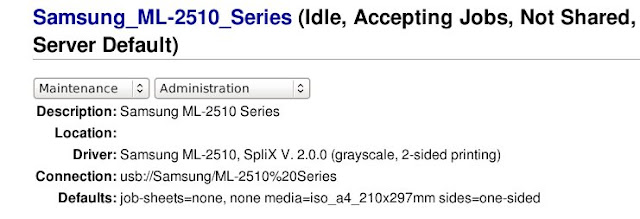These Splix drivers are in the repositories, and are separate to regular cups packages for the following reason:
Cheap and cheerful Lasers like Samsung ML-2510 do not use standard printer languages such as Postscript or PCL. Why Samsung have to be different is beyond me, but in any case, the solution is to install splix.
apt://splix
[ Above apt:// will take you directly to the package if you are using mozilla browser and have
aptlinex (Debian) or apturl (Ubuntu) installed ]( If you are a Mac user and find that your operating system has left you without a suitable driver after your OSX upgrade, then feel free to download the splix source or Debian .tar.gz both of which are licensed under GPL. It would be appreciated if you might remember in the future that GPL software, exists on your system, and helped your system, where your vender support proved insufficient. Enough GPL bashing please. )
Debian light desktop and ML-2510 plus 'Print to File':
On my debian desktop I prefer a light window manager (Xfce) and so I will be exploring how to setup printing without pulling in Gnome/KDE stuff where possible.
I already have
xfprint4 installed but this is a frontend is not in itself enough to print, without some sort of backend/daemon such as cups.apt-get install task-print-server splix
Now
task-print-server has pulled in cups, and so a printer daemon/backend is now installed on the system.
( Older Debian systems had a package called printconf
that may have been used instead of task-print-server )
that may have been used instead of task-print-server )
There is a further step now because this Samsung needs more than a standard cups driver - as Samsung Lasers uses Spl2 proprietary printing language.
What you are aiming for is this:
...which indicates that cups have a usable .ppd file for Samsung ML-2510.
To get to that result, you are going to have to interact with cups a little (see below) or you might try just a straight file copy should you feel adventurous.
...and choose your options...
...and setup is pretty much complete.
You might wish to have your system capable of a .pdf output directly from the printing system ( not to be confused with Mozilla browser 'print to file/pdf' )
apt-get install cups-pdf
Something to remember, is to set 'Server Default' properly, if you have several output choices on your system. That way your system knows which is your preference.
The key piece in the above screenshot is the text Server Default)
Additional information about Mozilla browser 'Print to file/pdf':
Mozilla Browser (Firefox) has it's own way of outputting .ps or .pdf files that is independent of your printer server.
( Mozilla relies on
libcairo2 vector graphic library for it's 'Print to file/pdf' )Here is a screenshot that might be familiar to anyone who uses 'Print to file/pdf' or 'Print to file/ps' from Mozilla Firefox.
To clarify further, that 'Output format' radio button choice (PDF or Postscript) is very specific to Mozilla Firefox and is not system wide.
The above crop shows a dialog portion which you will only encounter in Mozilla Firefox, and so do not expect to see that in OpenOffice or elsewhere.
OpenOffice has its own 'Export to PDF' option should you wish to go that way.
Notes and Further Reading:
I have used Mozilla Firefox and Iceweasel (Debian) interchangeably in this article as the actual package name is not an important part of this article.
Splix V 2.0.0 drivers are in Debian 7 (wheezy) and earlier release (squeeze)
- List of Printers (Dell, Samsung, Xerox) that use SPL language [ splix.ap2c.org ]
- Configuration Screenshot for Energy Settings [ splix.ap2c.org ]
- Using devices that take advantage of JBIG compression and Corporate Setting
The Samsung ML 2510 which I own, does not require a module that supports JBIG compression, however some of the other Samsung SPL2 printer language printers do.
There is much to read about JBIG and JBIG2 if that interests you. Some points:
- All patents have now expired for JBIG (JBIG1)
- JBIG compression system includes no active patents now
[ wikipedia.org ] - JBIG2 is very different to JBIG1 and does have active patent filings.
- Pdf standard 1.4 may include data compressed with JBIG2
- JBIG kit download [ cl.cam.ac.uk ]







No comments:
Post a Comment